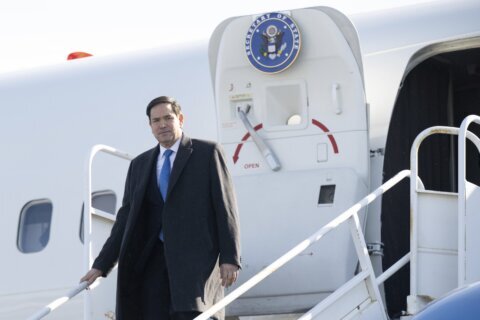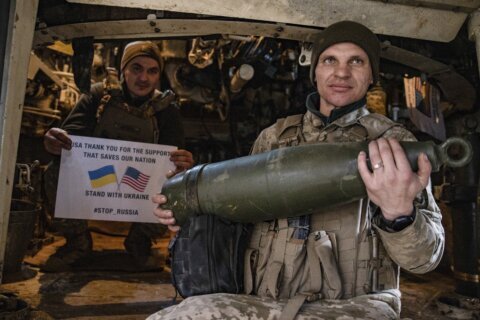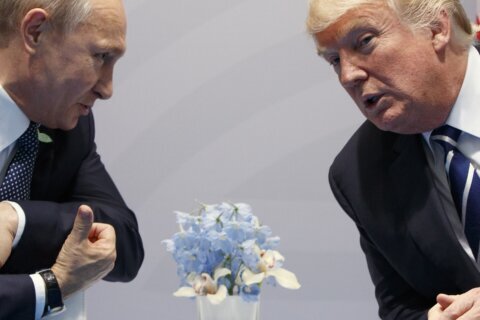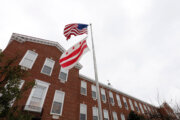BEIJING (AP) — Finland’s president said North Korea’s dispatch of troops to Russia represents an escalation of the Russia-Ukraine war that goes against China’s own stated position on the conflict, following talks Tuesday with the Chinese president.
Finnish President Alexander Stubb made his comments after meeting for more than three hours with China’s President Xi Jinping in Beijing in a visit to discuss the war as well as trade and other issues. Chinese officials did not comment on specifics, but Chinese state media said the two sides had an in-depth exchange.
“North Korean activity right now, both in terms of arms exports and especially in terms of sending troops to Russia is escalation, expansion and provocation,” Stubb said.
The U.S. government on Monday said that North Korea has sent 10,000 troops to Russia where they are believed to be headed for the Kursk border region where Ukrainian troops have seized Russian territory.
Stubb said that deployment defies China’s position that there should be “no escalation, no expansion and no provocation” on the battlefield. China and Brazil issued a joint peace plan earlier this year that calls for no expansion of the battlefield.
The Finnish leader also said that China should continue its efforts in pushing for peace in Ukraine, and that the starting point should be Ukraine’s peace plan. He also expressed concerns that Russian President Vladimir Putin could deploy nuclear weapons in the course of war.
“It’s extremely important that a major power such as China keeps on having dialogue with Russia and make sure that we can de-escalate as much as possible,” Stubb said.
Xi, for his part, expressed China’s “willingness to work with all parties concerned, including Finland, to continue to play an active role in promoting a peaceful resolution of the crisis,” according to state broadcaster CCTV.
Stubb and Xi previously had met 14 years ago, the Chinese leader noted in his welcome remarks before their meeting. They had met when Stubb was Finland’s foreign minister and Xi was China’s vice president.
“I am willing to work together with you to guide both countries in strengthening strategic cooperation, …, and make a new contribution towards world peace and development” Xi said before the meeting.
Finland is one of the most active European providers of military and civilian aid to Ukraine, and joined NATO last year because of Russia’s invasion of Ukraine. The country of 5.6 million shares a land border of 1,340 kilometers with Russia. Stubb, upon getting elected, said Finland’s priorities include maintaining a hard line toward Moscow and Russia’s current leadership, strengthening security ties with the U.S. and the need to help Ukraine both militarily and at a civilian level.
China on the other hand, has been criticized by the U.S. and NATO for its support of Russia. Specifically, the U.S. and NATO have called China an enabler of the war. NATO Secretary-General Jens Stoltenberg said China provides equipment, microelectronics and tools that are “enabling Russia to build the missiles, to build the bombs, to build the aircraft, to build the weapons they use to attack Ukraine.”
Yet, Beijing is increasingly also playing a role in mediation in some of the most contentious issues facing the world, as the country’s global footprint and economic power has grown, whether it’s the Russia-Ukraine war or the Israel-Hamas war.
The Finnish delegation included its environment and agriculture ministers, who signed agreements on water management, while China’s customs approved two Finnish poultry producers for import.
The two also discussed trade, a thorny issue as the European Union is planning to impose tariffs on Chinese built electric cars. The tariffs are under negotiation currently. Stubb said that China’s relationship with Russia “has a direct effect on China’s relationship with Europe,” he also said.
But he also expressed concern about tariffs, “My worry is that we’re going into a cycle of tariffs, of trade, escalation, etc., etc.. We need to avoid that.”
Copyright © 2025 The Associated Press. All rights reserved. This material may not be published, broadcast, written or redistributed.







